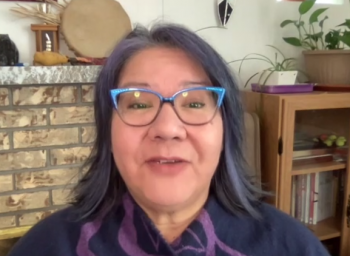Image Caption
Summary
Local Journalism Initiative Reporter
Windspeaker.com
The reason chiefs voted for RoseAnne Archibald wasn’t because she is a woman, said the new national chief of the Assembly of First Nations. It was her 31 years of experience that won them over.
Archibald said, however, a focus of her leadership will be to make the advocacy organization safe for women and gender-diverse people, and approach issues and relationships in a “heart-centred” way.
Her experience will guide her as she builds a relationship with the federal government that will be based on seeing the Prime Minister “as a human being (and) at the same time holding the government to account.”
“I’m holding two spaces within me … With that heart-centred approach together with any government, we can move the yardstick. We can create quantum leaps of change. And that’s my plan,” said Archibald in her first press conference July 9.
Scheduling meetings with Prime Minister Justin Trudeau and Cabinet ministers are in the works right now, she said.
Archibald outlined her 100-day plan which included key issues such as holding “government partners” to task in “the recovery of our children at former residential schools”; implementing an action plan for implementation of all 94 Calls to Action from the Truth and Reconciliation Commission on Indian residential schools and implementation of a national action plan on missing Indigenous women and girls; addressing systemic racism in health and the full justice system; tackling the climate change crisis; and establishing a First Nations economic growth and prosperity table.
She also wants to work with regions and sub-regions to build a post-pandemic recovery plan that takes into account social, health and economic determinants.
Archibald said she would be reviewing the goals set out in her election platform document with chiefs, national leaders, and regional chiefs. Later, a detailed work plan will be developed by her office.
“Then the work plan document becomes a living document that we will follow for the next three years. I am setting a strategic direction toward evolutionary and positive change and I want to create a unified effort on long standing issues that have faced First Nations,” she said.
As for the internal workings of the AFN, Archibald was pressed to comment on allegations against her by 10 AFN male and female staff members of bullying and harassment, and if she would implement whistleblower and financial transparency policies.
Archibald said she could not comment on an internal investigation that resulted in a confidential report on the harassment and bullying allegations, but pointed out that in her three decades in politics she never had a complaint filed against her.
She said the allegations came forward “because of reprisal” because in December she called for a resolution for an independent review on harassment and bullying within the AFN of women and gender-diverse people. As a whistleblower, she said, she fully supported a whistleblower policy at the AFN.
As for an independent financial review of the AFN, Archibald said she could not comment on that either as the call came from the Chiefs of Ontario while she was Ontario regional chief and that it was a confidential resolution.
However, she committed to “mak(ing) sure that the finances of the AFN are run with integrity, that the chiefs are aware of where the money is being spent, particularly on contracts, and I will actually ensure that we create the proper mechanisms to have a healthy organization financially.”
Archibald was elected national chief yesterday, July 8, following the fifth ballot and after her lone contender, former Muskowekwan First Nation chief Reginald Bellerose, conceded. Archibald had 205 votes and Bellerose had 144 votes. Archibald’s combined support in the end was just over half of the 634 chiefs eligible to vote. However, only 406 chiefs registered to vote, with 350 casting ballots in the fifth round.
Archibald said she wasn’t concerned with the number of votes as she had received “hundreds and hundreds and hundreds of text messages from right across this country, chiefs from every region, male, female, two-spirited, so I feel embraced. I feel loved. I feel supported.”
Archibald is the first woman to serve as national chief of the AFN, an organization which, she pointed out, has the corporate name of the National Indian Brotherhood.
Local Journalism Initiative Reporters are supported by a financial contribution made by the Government of Canada.

